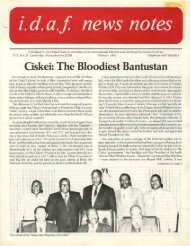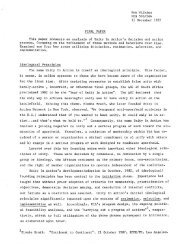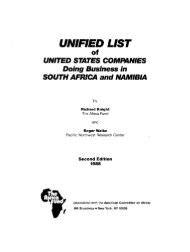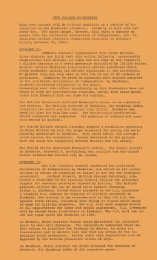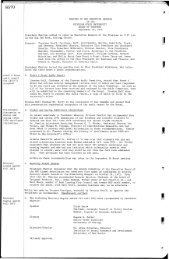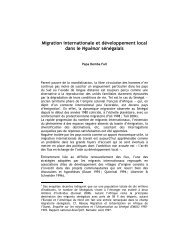the churches and southern africa - KORA
the churches and southern africa - KORA
the churches and southern africa - KORA
Create successful ePaper yourself
Turn your PDF publications into a flip-book with our unique Google optimized e-Paper software.
THERE'S A FORTUNE IN SOUTH AFRICA<br />
Activities of U.S. corporations have come under greater<br />
scrutiny during <strong>the</strong> past 12 months than at any o<strong>the</strong>r time<br />
in recent years. The I.T.T. affair was only <strong>the</strong> most<br />
prominent among numerous investigations into <strong>the</strong><br />
policies <strong>and</strong> impact of <strong>the</strong> multinationals-<strong>the</strong> giant<br />
businesses whose revenues are larger than <strong>the</strong> entire<br />
budgets of many small countries. A major focus bf<br />
inquiry has been corporate investments in <strong>the</strong> white<br />
minority controlled nations of Sou<strong>the</strong>rn Africa. This past<br />
spring's series of annual stockholder meetings has seen<br />
questions raised inside meetings by concerned investors,<br />
<strong>and</strong> pickets <strong>and</strong> protests outside <strong>the</strong> halls.<br />
In <strong>the</strong> wake of this challenge, corporations have mounted<br />
a counter-offensive using both <strong>the</strong> establishment media,<br />
such as <strong>the</strong> Wall Street Journal, Fortune, The New York<br />
Times, <strong>and</strong> direct statements to <strong>the</strong>ir individual<br />
stockholders. Thus since June, Mobil, Gulf Oil, <strong>and</strong> IBM<br />
have each released information for stockholders about<br />
<strong>the</strong>ir Sou<strong>the</strong>rn African operations in response to dem<strong>and</strong>s<br />
by several Protestant church agencies which hold stock in<br />
<strong>the</strong> three firms.<br />
All three firms assert that <strong>the</strong>ir presence in <strong>the</strong><br />
subcontinent contributes to <strong>the</strong> well-being of both black<br />
<strong>and</strong> white, <strong>and</strong> present data which <strong>the</strong>y argue<br />
substantiates <strong>the</strong> claim. The information provided,<br />
however, offers no verification of <strong>the</strong> <strong>the</strong>sis that<br />
economic involvement by U.S. business can be a benign<br />
presence. To <strong>the</strong> contrary-by <strong>the</strong>ir own testimony-<strong>the</strong><br />
companies must be judged guilty of acquiescence to <strong>the</strong><br />
inequities of <strong>the</strong> social order.<br />
The contention that U.S. operations in South Africa can<br />
generate progressive change has received recent support<br />
from Fortune magazine, whose July issue examined "The<br />
Proper Role of U.S. Corporations in South Africa." In a<br />
9-page article, lavishly illustrated with color photographs,<br />
<strong>the</strong> journal deals superficially with a number of complex<br />
economic <strong>and</strong> political trends. While criticizing <strong>the</strong> record<br />
of most U.S. firms as "very embarrassing, for <strong>the</strong> very<br />
good reason that <strong>the</strong>y don't live by <strong>the</strong> same rules <strong>the</strong>y<br />
practice at home," <strong>the</strong> author includes IBM <strong>and</strong> Mobil<br />
among <strong>the</strong> exceptions, <strong>and</strong> insists that "fundamental <strong>and</strong><br />
genuine reform" is possible.<br />
Symptomatic of Fortune's cursory examination of <strong>the</strong><br />
issues is <strong>the</strong> pretence that barriers to real black job<br />
advancement are crumbling. A photo labeled "Breaching<br />
<strong>the</strong> color bar," for example, shows young Asian women<br />
bonding transistor elements at I.T.T.'s Johannesburg<br />
subsidiary. In fact <strong>the</strong> shortage of skilled white workers<br />
has led to a situation where those particular jobs, once<br />
done only by whites, are now performed only by poorly<br />
paid Asians; apar<strong>the</strong>id remains intact. Black workers are<br />
being used to do <strong>the</strong> semiskilled jobs which whites refuse<br />
to do.<br />
Two Sou<strong>the</strong>rn Africa Committee members visiting <strong>the</strong><br />
same facility were told by officials that <strong>the</strong> company not<br />
only separates black workers from whites wherever<br />
possible, but also prefers to segregate coloureds <strong>and</strong><br />
Asians from o<strong>the</strong>r groups <strong>and</strong> from each o<strong>the</strong>r. (See cover<br />
photograph.) Revealing both a sexual <strong>and</strong> racial bias, a<br />
public relations officer explained that such jobs, although<br />
intricate, do not require a high level of skill or<br />
intelligence. "Indian women are good at tedious repetitive<br />
jobs that bore men. In fact, <strong>the</strong>y enjoy it."<br />
Fortune points to blacks doing work once reserved for<br />
whites as examples of <strong>the</strong> fundamental changes it thinks<br />
desirable. In fact, <strong>the</strong> phenomenon is merely a continuing<br />
modification of <strong>the</strong> entire economy as it becomes more<br />
technologically sophisticated. Whites move on to more<br />
complex tasks while blacks take <strong>the</strong>ir place on lower-skill<br />
rungs. Such periodic adjustments have marked South<br />
Africa's history from <strong>the</strong> beginning, <strong>and</strong> are not evidence<br />
of weakness but of <strong>the</strong> strength of <strong>the</strong> white power<br />
structure to make <strong>the</strong> adaptations necessary for survival.<br />
The whites remain in control, economic <strong>and</strong> political; <strong>the</strong><br />
concessions made simply oil <strong>the</strong> wheels of <strong>the</strong> machinery;<br />
<strong>the</strong>y do not change <strong>the</strong> operators.<br />
All this is not to say that Sou<strong>the</strong>rn Africa is a monolithic<br />
<strong>and</strong> invincible mass. The tensions of an industrial,<br />
capitalist economy exist <strong>the</strong>re as elsewhere <strong>and</strong> will be<br />
exploited by <strong>the</strong> Sou<strong>the</strong>rn African majority as <strong>the</strong><br />
struggle for freedom grows. But <strong>the</strong> forces of justice will<br />
not emanate from corporate America. In some firms at<br />
certain times, blacks WILL become <strong>the</strong> beneficiaries of<br />
higher wages <strong>and</strong> better working conditions, but only<br />
when <strong>the</strong> company sees its own self-interest clearly<br />
protected by <strong>the</strong> improvement. Corporate self-reform is<br />
inevitably self-limiting-its aim is to obtain <strong>the</strong> greatest<br />
good for a single corporation, not <strong>the</strong> greatest good for a<br />
whole society!<br />
In today's Sou<strong>the</strong>rn Africa, U.S. businesses believe that<br />
profits will be jeopardized by a too hasty departure from<br />
accepted practice. And profits are <strong>the</strong> prize to be pursued.<br />
As IBM pointed out to stockholders at its 1972 annual<br />
meeting: "Our primary corporate purpose, of course, in<br />
all we do, is to keep this a sound, healthy business, <strong>and</strong><br />
we never lose sight of that."


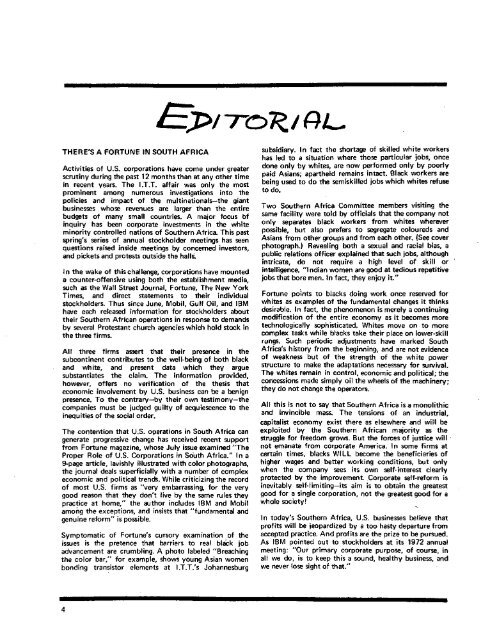
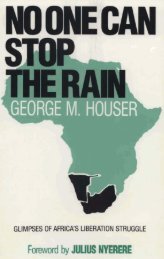
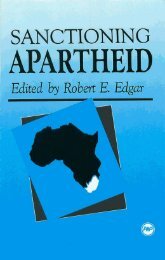


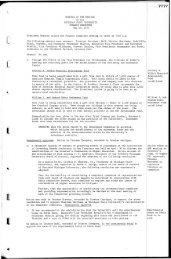
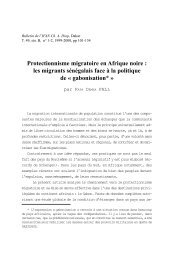

![Synthèse [6] DEFALL..INSTRAW.pdf - Matrix](https://img.yumpu.com/17880734/1/190x245/synthese-6-defallinstrawpdf-matrix.jpg?quality=85)

